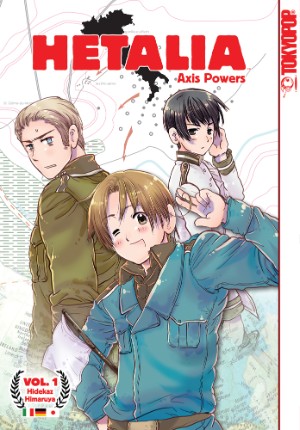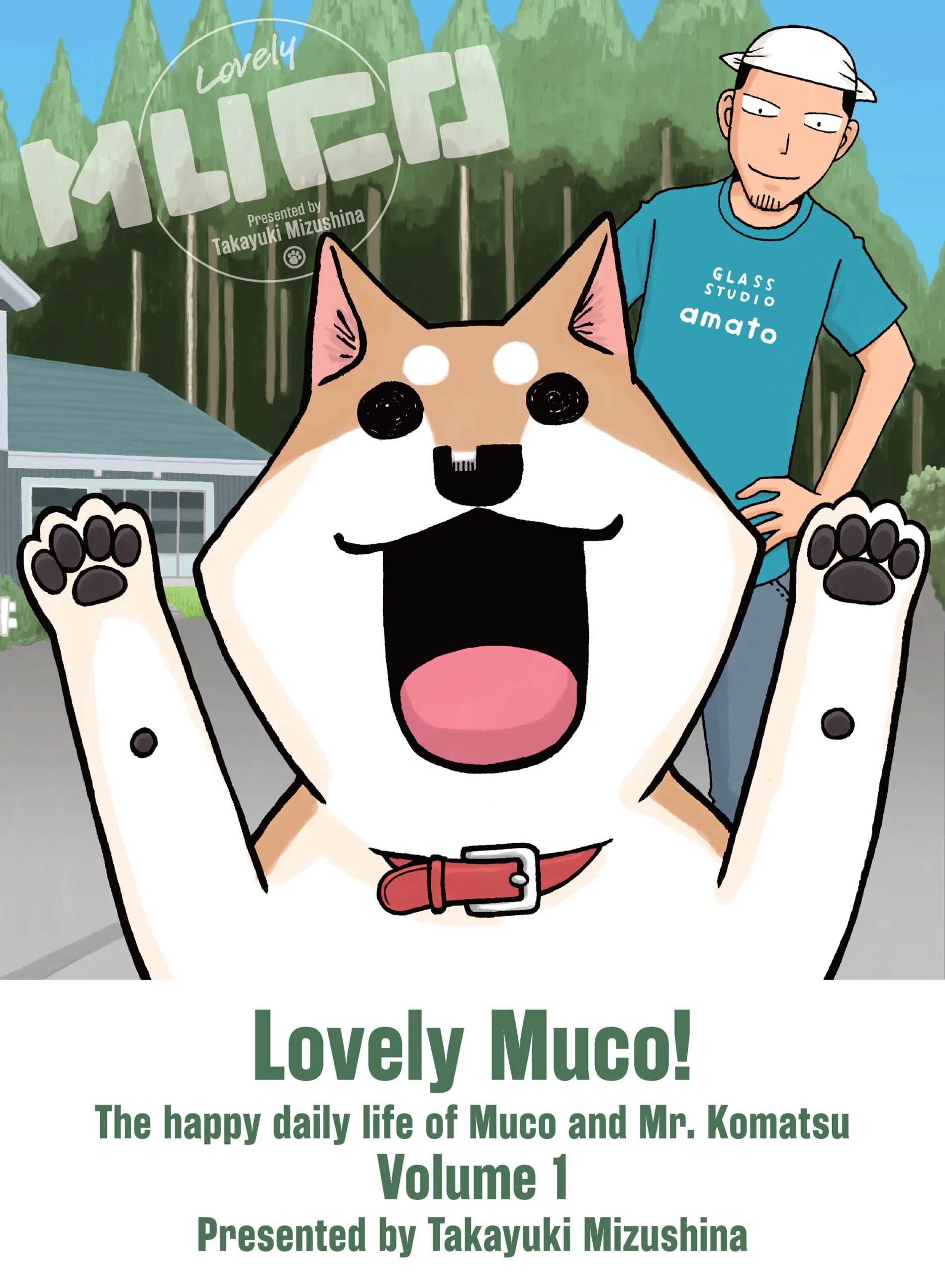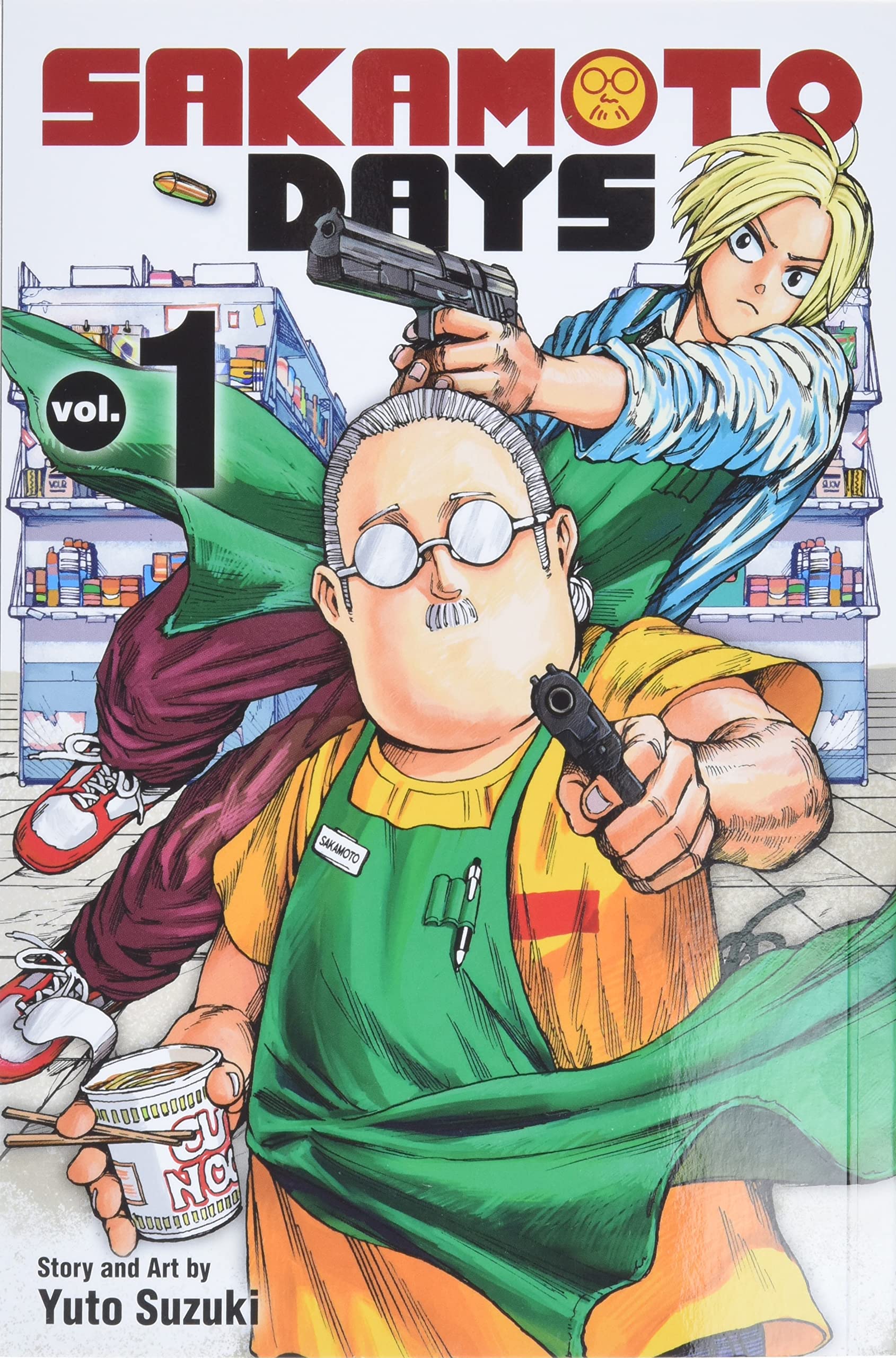To say that Hetalia: Axis Powers has a devoted fanbase is like saying that Cookie Monster is partial to Oreos; it’s the kind of series that inspires fans to write their own Hetalia stories by the truckload (there are over 14,000 posted at FanFiction.net), dress up as their favorite countries, and debate the virtues of various characters with quasi-religious intensity.
Part of Hetalia‘s appeal lies with the artwork: manga-ka Hidekaz Himeyura populates his stories with cute, attractive young men in lavishly detailed military costumes that are tailor-made for cosplay. The other part of Hetalia‘s appeal lies with its cheerfully subversive premise: all the major participants in World War II are represented as petulant bishies whose behavior mimics the way these countries interacted in the 1930s, and whose personalities conform to well-rehearsed national stereotypes. Whether or not you cotton to Hetalia will depend largely on whether you find the underlying concept a stellar example of the Japanese ability to kawaii-ify anything or proof that Japan’s younger generation doesn’t grasp just how terrible World War II really was.
I fall somewhere in the middle of the continuum: I’m not offended by Hetalia, but I’m not amused, either. Himaruya has certainly done his homework, seeding the dialogue with salacious historical tidbits and inserting flashbacks to major European wars of the eighteenth and nineteenth centuries, yet he never challenges the basic stereotypes that guide all the characterizations: Japan is prissy and horrified by European cuisine, England views America as his ill-behaved offspring, America loves hamburgers and talks with his mouth full, Germany is efficient and belligerent, and Northern Italy adores pasta and shirks responsibility. The endless stream of nationality-as-destiny jokes grows tiresome quickly; imagine spending an afternoon with someone who insists on referring to the French as “cheese-eating surrender monkeys” every time you mention a recent trip to Paris, and you have some idea of how stale the better gags become on their third or tenth repetition.
From time to time, Himaruya inserts the kind of pointed, tasteless joke that suggests at true subversion. In one scene, for example, Germany finds himself at a supermarket check-out, fuming because Korea is holding up the line, demanding reparations and an apology for how he’s been treated. A more skilled writer could have done something with this moment, perhaps using it as a jumping off point for exploring the complicated relationship between Japan and Korea. Instead, Himaruya treats this moment as just another wacky example of a country behaving according to national character, as if Korea’s legitimate protests over Japanese occupation were akin to Italians loving red wine or Russians placing ineffectual curses on their enemies. I’m mildly horrified to contemplate how Himaruya will treat German anti-Semitism — a personal quirk?
Which brings me to my biggest criticism of Hetalia: Axis Powers: there’s a strong whiff of pointlessness about the whole enterprise. Himaruya goes to great pains to get the history right, but it’s never clear what the series’ underlying message really is; why depict one of the ugliest, most brutal periods in human history as a cute, interpersonal drama if you’re not trying to make some greater point about the folly of international alliances, or the dangers of aggressive nationalism? I have no doubt that Trey Parker and Matt Stone could run with the Hetalia premise and turn it into something genuinely funny, rude, and intelligent, but Himaruya just doesn’t have the historical insight or the courage to do much with the material except make all the participants look very pretty.
Review copy provided by Tokyopop. Volume one of Hetalia: Axis Powers will be released on September 21, 2010.
HETALIA: AXIS POWERS, VOL. 1 • BY HIDEKAZ HIMARUYA • TOKYOPOP • 152 pp. • RATING: OLDER TEEN (16+)




Manga Therapy says:
“Which brings me to my biggest criticism of Hetalia: Axis Powers: there’s a strong whiff of pointlessness about the whole enterprise. Himaruya goes to great pains to get the history right, but it’s never clear what the series’ underlying message really is; why depict one of the ugliest, most brutal periods in human history as a cute, interpersonal drama if you’re not trying to make some greater point about the folly of international alliances, or the dangers of aggressive nationalism?”
This is why I’m wondering why so many people love this series. It’s nothing but pretty boys running around, fooling around with each other and what not. I know this series isn’t exactly “moe”, but it’s pretty damn close to it. What is Himaruya trying to prove with this series? Then again, Japanese people do think of the strangest things…..
Aaron says:
I have only watched the Anime adaptation of this and I absolutely hated it so I doubt I’ll like the Manga it really does seem pointless couldn’t of said it better myself Kathrine
Katherine Dacey says:
@Manga Therapy: I don’t really get the appeal either, so I asked my boyfriend’s daughter, who is a huge fan of the series. She loves the costumes and the banter between the characters, especially all the jokes about Italy’s laziness and love of food — both are fodder for two of her biggest hobbies, cosplaying and writing fan fiction. I’d be curious to hear from other hardcore fans about why they love the series so much.
@Aaron: My impression of the anime — which may be completely wrong, BTW — is that the ethnic humor is more risque, with some jokes about Germany’s anti-Semitism in the mix. I guess I spent too much time in History classes to find that kind of joke daring or particularly funny, especially when it’s in service of, well, nothing, really. It could have been worse, though: at least we weren’t treated to bishie Hitler and bishie Stalin!
Erica says:
I think the point is precisely that it is boy moe, with little depth and easy-to-understand personality quirks, combined with uniforms targeted at readers young enough to be removed from the horrors of WWII, the larger implications of those “cute” quirks and the potential harm stereotyping causes that makes it so popular.
Mostly, the readers aren’t looking for depth in these kind of avataristic shows. No one complained that the personification of Tokyo train stations left them wanting a deeper explanation – and we’re going to see more of this kind of thing, as it’s taking off in Japan in a BIG way right now.
The audience doesn’t care about historical accuracy, socio-political meaning or cultural ramifications…it likes cute boys in uniform that sexual harass each other.
Aaron says:
@ Kathrine Dacey
at least we weren’t treated to bishie Hitler and bishie Stalin!
Don’t forget After school chrisima but yeah that image just brings up images of moe versions of the great dictators of all time I better stop before somebody actually creates it (LOL)
Anonymous says:
What annoys me is that the premise could be so awesome if there was a sense of self awareness. For example, I would love to see a series where people of different nationalities INTENTIONALLY live up to their stereotypes. That would be fun.
Jade says:
This perfectly sums up my own opinion of Hetalia. It can be hard to really get to the heart of what’s so frustrating about it in the face of such a huge fan bloc; I second guess a lot of my criticism plain old contrariety in situations like that especially in light of some of the discussions of reaction towards feminine fandoms. It’s great to see it all so well defined here though: not offensive, but not amusing and overall, pointless. I would like to hilight though, as you mentioned with Parker and Stone, the lack of offence is more a failure than a benefit.
Moe can be a nice design scheme to create some strong characterizations not too bogged down by environmental character development, but here, like a lot of the moe stories that fall flat, it’s an excuse to cut away character flaws and hobble any possibility of commenting on any genuine human interaction. Moe as a form of minimalism or even an inspection of the creator’s own interests, I can get behind and have seen work well, but this is just moe as pandering nonsense with no soul. That it panders to diet bigotry is about as entertaining as a wet fart, but the characterizations are too impotent and jokes too juvenile to really offend.
Katherine Dacey says:
@Erica: I’m glad to know that my curmudgeonly history major take on Hetalia is actually borne out by what you say about the series’ Japanese fans; I didn’t want to sound like a jerk for calling readers out on their knowledge of European history.
@Aaron: I’d forgotten about Hitler’s appearance in Afterschool Charisma. Does Stalin appear in that series, too? Wow, that would be tasteless.
@Anonymous: Good point! It’s one thing to deliberately examine stereotypes — and possibly affirm the truth of them — but another to use them as a crutch for lame comedy.
@Jade: Agreed on the lack of offense; if you’re going to do something as potentially vulgar as Hetalia, you need to make a full-bore commitment to the material instead of trying to making it cute and winsome. I admit that I haven’t really developed any philosophical stance on moe, though I find your comments on moe-as-minimalism intriguing — definitely something to contemplate earlier in the day, when I’m operating on full steam power!
Animu Info says:
Hetalia is much like this, its like controversy for fangirls and I have heard that most girls have learn to like history because of Hetalia. Anything related with fangirls is kinda senseless at first look, at least for me. I guess what I am trying to say is that fangirls is a big market and Hetalia is exploiting it.
Katherine Dacey says:
@Animu: I agree that the fangirl market is big, and that the series might well inspire readers to learn more about 20th century European history. I’m a lot more reluctant, however, to use a word like “senseless” to describe Hetalia‘s female fans; there are plenty of male fandoms that are equally mystifying to outsiders, too. Don’t get me wrong: I’m equally puzzled by Hetalia‘s popularity, but that’s because I’m a woman with a BA in History who studied the events depicted in the series, not because I’m generally baffled by fangirl culture.
Anonymous says:
Any fandom is weird if you are not part of it, and that is part of the fun. You can feel like you’re viewing something edgy, or niche, or just generally different.
Animu Info says:
@Katherine – Well, fangirls have different approach on things, and one thing that makes me really awed about hetalia is that it made fangirls like history, maybe because how Hidekaz presented the series that generally interested the fangirls but what I think hetalia did is that it presented history in a way very palatable to fangirls and the fangirls just went on it. I guess that young teen girls and BA people have different trains of thought.
Katherine Dacey says:
@Anonymous: Touche! Another good point. Small wonder sociologists and anthropologists are studying fan communities.
@Animu: I think I misread your comment — I didn’t realize your statement was essentially a positive one, not a diss of female fans. Thanks for the clarification.
Aaron says:
@ Katherine
II looked up Afterschool Charisma no cloned Stalin but we do get a cloned Rasputin and the Hitler clone feels like he needs to be punished for the sins of his original I read the first chapter and man it’s good